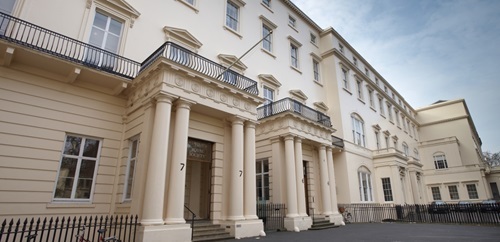The Royal Society science office says the suspense will soon be over. It will announce presenter names/topics for the November evolution paradigm shift conference within two weeks -- democratically, by email to all those registered to attend the public meeting. What's more, it has added to its original list of invitees. Zoologists perhaps at last conceding viruses belong in the tent?
I understand that many of those in the Royal Society audience will be scientists as prominent as (and possibly more prominent than) some of the speakers, and as evolutionary science continues to be a tribal matter, it is expected to be a lively meeting. As for whether it will be an effective meeting, i.e., whether deep divisions can be bridged -- I'm optimistic. I am reminded of something Markus Nordberg, CERN's savvy chief of Resources Development, once told me about the strategy of organizing such meetings:
"When you invite friends of the friends, they don't argue too much . . . so that at least you have a little bit of critical mass . . . but then you have to expose it. That is to say, you organize a public meeting where the enemies of the friends are invited . . . it's polarized . . . people mix like hot and cold water. And that's the point at which you are able to set up a collaboration."
However, grumblings about paradigm shift are coming not only from "the enemies," i.e., the usual suspects (who are likely to send their disruptive "representatives" to the London gathering) -- but from more measured, responsible voices like Indiana University biologist Michael Lynch. Lynch recently responded to my story about the Extended Synthesis crowd who've now been funded by Templeton with $8M but still can't agree on a definition for Extended Synthesis with this note:
"Superficial, silly, shallow-minded, self-promotional. I and many others view this as a complete embarrassment to the field. If one wishes to extend something in public, especially as a biologist, one ought to have a very good idea of what is being extended."
Even Stan Salthe, one of evolution's long-time progressive voices is dissatisfied with the fuzziness of language, emailing:
"Philosophically, the only difference between the earlier (new) synthesis and the new (extended) one is that the new one downgrades random mutation as the only source of new departures, allowing the biological system to potentially have some agency in its evolution during ontogeny."
There are some, in fact, who think the whole thing is a game of semantics and that I've "been had" regarding my interest.
Denis Noble, point man for the Royal Society conference, further addressed the matter of evolutionary science word play in a recent email to me:
"One of the problems I see in this field of evolutionary biology is that there are now a variety of definitions of what the neo-Darwinist Modern Synthesis includes. A recent reply to my J Exp Biol article even includes the inheritance of acquired characteristics! But if we define the Modern Synthesis as its original formulation to exclude the inheritance of acquired characteristics, which was Weizmann's intention, which was followed by many others and summarized by Mayr, then the ES must be a replacement not simply an extension and it is so by definition.
Moreover, anyone who now tries to include the inheritance of acquired characteristics in neo-Darwinism is left with the question why it should any longer be described as neo-Darwinism since Darwin also included the inheritance of acquired characteristics in his Origin of Species and even, in a later work, developed his theory of gemmules to account for it. The key difference between Darwinism and neo-Darwinism disappears. There is then no need for neo-Darwinism.
Of course there are many other reasons for replacing the MS by a more integrative, multi-process theory. Those include symbiogenesis, natural genetic engineering, the physics of development. . . . . . . . . ."
No doubt the virosphere is implied, as well, somewhere in Denis Noble's above "extended ellipsis."
Clearly, the Extended Synthesis does not go far enough in reflecting current evidence. The last major Extended Synthesis paper by Gerd Müller -- one of the fathers of the Extended Synthesis, who will be at the November gathering to explain his latest ES position -- was, e.g., virtually virus-free (the word virus appears one time).
Santa Fe Institute physicist Geoffrey West thinks the hard sciences definitely need to be factored into the equation at the November meeting. And Adrian Bejan, author of The Physics of Life, will attend to make sure they are.
Other prominent scientists who've registered include biosemiotics ambassador Kalevi Kull, and plant physiologist/ambassador František Baluška. Michael Joyner from Mayo Clinic and John Torday from UCLA's David Geffen School of Medicine will bring their medical perspective to the gathering, as will neurobiologist and developmental psychologist Jonathan Delafield-Butt, who's now busily organizing his own conference in Scotland on autism.
I would expect both former Royal Society president Sir Paul Nurse and current president Sir Venki Ramakrishnan to waft in at some point during the three-day affair. And that there will no doubt be tributes (whether formal or informal) to some of evolution's revolutionaries, now gone: Mae-Wan Ho, Lynn Margulis and Carl Woese.
But it may well be the presence of science historian and dramatist Richard Milner -- currently promoting the life of Alfred Russell Wallace -- with his repertoire of disarming songs, such as "I'm a Genius," that proves most crucial to the November proceedings, that is, if chairs really do begin flying. . .

